- Home
- Neil Gaiman
Anansi Boys Page 20
Anansi Boys Read online
Page 20
After a while, he got bored with waiting, and wandered back into Fat Charlie’s flat. There was nobody there. The place was a mess—it looked like it had been turned upside down by trained professionals. Spider decided that, in all probability, Fat Charlie had messed the place up himself to indicate how upset he was that Spider had beaten him in their fight.
He looked out of the window. There was a police car parked outside beside a black police van. As he watched, they drove away.
He made himself some toast, and he buttered it and ate it. Then he walked through the flat, carefully closing all the curtains.
The doorbell rang. Spider closed the last of the curtains, then he walked downstairs.
He opened the door and Rosie looked at him. She still seemed a little dazed. He looked at her. “Well? Aren’t you going to invite me in?”
“Of course. Come in.”
She walked up the stairs. “What happened here? It looks like an earthquake hit.”
“Yeah?”
“Why are you just sitting in the dark?” She went to open the curtains.
“Don’t do that! Just keep them closed.”
“What are you scared of?” asked Rosie.
Spider looked out of the window. “Birds,” he said, eventually.
“But birds are our friends,” said Rosie, as if addressing a small child.
“Birds,” Spider said, “are the last of the dinosaurs. Tiny velociraptors with wings. Devouring defenseless wiggly things and, and nuts, and fish, and, and other birds. They get the early worms. And have you ever watched a chicken eat? They may look innocent, but birds are, well, they’re vicious.”
“There was a thing on the news the other day,” said Rosie, “about a bird who saved a man’s life.”
“That doesn’t change the fact that—”
“It was a raven, or a crow. One of those big black ones. The man was lying on the lawn in his home in California, reading a magazine, and he hears this cawing and cawing, and it’s a raven, trying to attract his attention. So he gets up and goes over to the tree it’s perched on, and down beneath it is a mountain lion, that had been getting all ready to pounce on him. So he went inside. If that raven hadn’t warned him, he would have been lion-food.”
“I don’t think that’s usual raven behavior,” said Spider. “But whether one raven once saved someone’s life or not, it doesn’t change anything. Birds are still out to get me.”
“Right,” said Rosie, trying to sound as if she wasn’t humoring him. “Birds are out to get you.”
“Yes.”
“And this is because…?”
“Um.”
“There must be a reason. You can’t tell me the great plurality of birds has just decided to treat you as an enormous early worm for no particular reason.”
He said, “I don’t think you’d believe me,” and he meant it.
“Charlie. You’ve always been really honest. I mean, I’ve trusted you. If you tell me something, I’ll do my best to believe it. I’ll try really hard. I love you and I believe in you. So why don’t you let me find out if I believe you or not?”
Spider thought about this. Then he reached out for her hand, and he squeezed it.
“I think I ought to show you something,” he said.
He led her to the end of the corridor. They stopped outside the door to Fat Charlie’s spare room. “There’s something in here,” he said. “I think it’ll explain it a bit better than I can.”
“You’re a superhero,” she said, “and this is where you keep the batpoles?”
“No.”
“Is it something kinky? You like to dress up in a twinset and pearls and call yourself Dora?”
“No.”
“It’s not…a model train set, is it?”
Spider pushed open the door to Fat Charlie’s spare room, and at the same time he opened the door to his bedroom. The picture windows at the end of the room showed a waterfall, which crashed down into a jungle pool far below. The sky though the windows was bluer than sapphires.
Rosie made a small noise.
She turned around, walked back down the hall, into the kitchen, and looked out of the window at the gray London sky, doughy and unwelcoming. She came back. “I don’t understand,” she said. “Charlie? What’s happening?”
“I’m not Charlie,” said Spider. “Look at me. Really look at me. I don’t even look like him.”
She made no pretense of humoring him any longer. Her eyes were wide and scared.
“I’m his brother,” said Spider. “I’ve screwed everything up. Everything. And I think probably the best thing I can do is just get out of all your lives and go away.”
“So where’s Fat—where’s Charlie?”
“I don’t know. We were having a fight. He went off to answer the door, and I went off to my room, and he didn’t come back.”
“He didn’t come back? And you didn’t even try to find out what had happened to him?”
“Er. He might have been taken away by the police,” said Spider. “It’s just an idea. I have no proof or anything.”
“What’s your name?” she demanded.
“Spider.”
Rosie repeated it. “Spider.” Outside the window, above the spray of the waterfall, she could see a flock of flamingos in the air, the sunlight blurring their wings in pink and white. They were stately and uncountable, and it was one of the most beautiful things Rosie had ever seen. She looked back at Spider, and looking at him, she could not understand how she had ever believed that this man was Fat Charlie. Where Fat Charlie was easygoing, open, and uncomfortable, this man was like a steel rod bent back and ready to snap. “You really aren’t him, are you?”
“I told you I wasn’t.”
“So. So who did I. Who have I. Who was it—who did I sleep with?”
“That would be me,” said Spider.
“I thought so,” said Rosie. She slapped him, as hard as she could, across his face. He could feel his lip start bleeding once more.
“I guess I deserved that,” he said.
“Of course you deserved it.” She paused. Then she said, “Did Fat Charlie know about this? About you? That you were going out with me?”
“Well, yes. But he…”
“You are both sick,” she said. “Sick, sick, evil men. I hope you rot in Hell.”
She took one last puzzled glance around the enormous bedroom and then out of the bedroom window at the jungle trees and the huge waterfall and the flock of flamingos, and she walked away down the hall.
Spider sat down on the floor with a thin trickle of blood coming from his lower lip, feeling stupid. He heard the front door slam. He walked over to the hot tub and dipped the end of a fluffy towel into the hot water. Then he wrung it out and put it on his mouth. “I don’t need any of this,” said Spider. He said it aloud; it’s easier to lie to yourself when you say things out loud. “I didn’t need any of you people a week ago and I don’t need you now. I don’t care. I’m done.”
The flamingos hit the window glass like feathery pink cannonballs, and the glass shattered, fragments of window flying across the room, scattering and embedding themselves in the walls, the floor, the bed. The air was filled with plummeting pale pink bodies, a confusion of huge pink wings, and curved black beaks. The roar of a waterfall exploded into the room.
Spider pushed back against the wall. There were flamingos between him and the door, hundreds of them: five-foot-tall birds, all legs and neck. He got to his feet and took several steps through a minefield of angry pink birds, each of them glowering at him through mad pink eyes. From a distance, they might have been beautiful. One of them snapped at Spider’s hand. It didn’t break the skin, but it hurt.
Spider’s bedroom was a large room, but it was rapidly filling with crash-landing flamingos. And there was a dark cloud in the blue sky above the waterfall that appeared to be another flock on its way.
They were pecking at him and clawing at him and buffeting him with their wings
, and he knew that that was not actually the problem. The problem would be being suffocated under a fluffy pink blanket of feathers with birds attached. It would be an astonishingly undignified way to go, crushed by birds, and not even particularly intelligent birds.
Think, he told himself. They’re flamingos. Bird-brains. You’re Spider.
So? he thought back at himself, irritated. Tell me something I don’t know.
The flamingos on the ground were mobbing him. The ones in the air were diving toward him. He pulled his jacket over his head, and then the airborne flamingos began hitting him. It was like having someone firing chickens at you. He staggered and went down. Well, trick them, stupid.
Spider pushed himself to his feet and waded through the sea of wings and beaks until he reached the window, now an open jaw of jagged glass.
“Stupid birds,” he said, cheerfully. He pulled himself up onto the window ledge.
Flamingos are not famed for their cutting intelligence, nor for their problem-solving abilities: confronted with a twist of wire and a bottle with something edible in it, a crow might try to make a tool out of the wire in order to get at the contents of the bottle. A flamingo, on the other hand, will try and eat the wire, if it looks like a shrimp, or possibly even if it doesn’t, just in case it was a new kind of shrimp. So if there was something slightly smoky and insubstantial about the man who stood on the window ledge insulting them, the flamingos failed to perceive it. They glared at him with the crazed ruby eyes of killer rabbits, and they rushed toward him.
The man dove from the window, down into the spray of the waterfall, and a thousand flamingos launched themselves into the air after him, many of them, given the run-up a flamingo needs to get properly airborne, tumbling like stones.
Soon the bedroom contained only injured or dead flamingos: the ones who had broken the windows, the ones who had crashed into the walls, the ones who had been crushed beneath other flamingos. Those of the birds who were still alive watched the bedroom door open, apparently by itself, and close again, but, being flamingos, they thought very little of it.
Spider stood in the corridor of Fat Charlie’s flat and tried to catch his breath. He concentrated on letting the bedroom stop existing, which was something that he hated to do, mostly because he was incredibly proud of his sound system, and also because it was where he kept his stuff.
You can always get more stuff, though.
If you’re Spider, all you really have to do is ask.
ROSIE’S MOTHER WAS NOT A WOMAN GIVEN TO GLOATING loudly, so when Rosie broke down in tears on the Chippendale sofa, her mother refrained from whooping, from singing, or from doing a small victory dance and then shimmying around the room. A careful observer, however, might have noticed a glint of triumph in her eyes.
She gave Rosie a large glass of vitaminized water with an ice cube in it and listened to her daughter’s tearful litany of heartbreak and deception. By the end of it, the glint of triumph had been replaced with a look of confusion, and her head was starting to spin.
“So Fat Charlie wasn’t really Fat Charlie?” said Rosie’s mother.
“No. Well, yes. Fat Charlie is Fat Charlie, but for the last week I’ve been seeing his brother.”
“They are twins?”
“No. I don’t even think they look alike. I don’t know. I’m so confused.”
“So which one of them did you break up with?”
Rosie blew her nose. “I broke up with Spider. That’s Fat Charlie’s brother.”
“But you weren’t engaged to him.”
“No, but I thought I was. I thought he was Fat Charlie.”
“So you broke up with Fat Charlie as well?”
“Sort of. I just haven’t told him yet.”
“Did he, did he know about this, this brother thing? Was it some kind of evil kinky conspiracy they did to my poor girl?”
“I don’t think so. But it doesn’t matter. I can’t marry him.”
“No,” agreed her mother. “You certainly cannot. Not one bit.” Inside, in her head, she did a victory jig and set off a large but tasteful celebratory display of fireworks. “We can find you a good boy. Don’t you worry. That Fat Charlie. He was always up to no good. I knew it the first moment I saw him. He ate my wax fruit. I knew he was trouble. Where is he now?”
“I’m not sure. Spider said he might have been taken away by the police,” said Rosie.
“Hah!” said her mother, who increased the fireworks in her head to New Year’s Eve at Disneyland proportions and mentally sacrificed a dozen flawless black bulls for good measure. Aloud, all she said was, “Probably in prison, you ask me. Best place for him. I always said that was where that young man would end up.”
Rosie began to cry, if anything even harder than before. She pulled out another wadge of paper tissues and blew her nose with an extreme honk. She swallowed bravely. Then she cried some more. Her mother patted the back of Rosie’s hand as reassuringly as she knew how. “Of course you can’t marry him,” she said. “You can’t marry a convict. But if he’s in prison you can easily break off the engagement.” A spectre of a smile haunted the corners of her lips as she said, “I could call on him for you. Or go there on a visitor’s day and tell him he’s a lousy crook and you never want to see him again. We could get a restraining order, as well,” she added helpfully.
“Th-that’s not why I can’t marry Fat Charlie,” said Rosie.
“No?” asked her mother, raising one perfectly penciled eyebrow.
“No,” said Rosie. “I can’t marry Fat Charlie because I’m not in love with him.”
“Of course you aren’t. I always knew that. It was a girlish infatuation, but now you see the true—”
“I’m in love,” continued Rosie, as if her mother had not spoken, “with Spider. His brother.” The expression that made its way across her mother’s face then was a cloud of wasps arriving at a picnic. “It’s okay,” said Rosie. “I’m not going to marry him, either. I’ve told him I never want to see him again.”
Rosie’s mother pursed her lips. “Well,” she said, “I can’t pretend I understand any of this, but I can’t say it’s bad news, either.” The gears in her head shifted, and the cogs interlocked in new and interesting ways: ratchets ratchetted and springs resprung. “You know,” she said, “what would be the best thing for you right now? Have you thought about taking a little holiday? I’m happy to pay for it, all the money I’m saving on the wedding after all…”
That may have been the wrong thing to say. Rosie began to sob into her tissues once again. Her mother went on, “Anyway, it would be my treat. I know you’ve got holiday time you haven’t used at work. And you said things were quiet right now. At a time like this, a girl needs to get away from everything and simply relax.”
Rosie wondered whether she’d misjudged her mother all these years. She sniffed and swallowed and said, “That would be nice.”
“Then it’s settled,” said her mother. “I shall come with you, to take care of my baby.” In her head, underneath the grand finale of the fireworks display, she added, And to make sure that my baby only meets the right sort of man.
“Where are we going?” asked Rosie.
“We’re going to go,” said her mother, “on a cruise.”
FAT CHARLIE WAS NOT HANDCUFFED. THAT WAS GOOD. EVERYTHING else was bad, but at least he wasn’t in handcuffs. Life had become a confused blur filled with too-sharp details: the duty sergeant scratching his nose and signing him in—“Cell six is free”—through a green door and then the smell of the cells, a low-level stench he had never before encountered but which was immediately and horribly familiar, a pervasive fug of yesterday’s vomit and disinfectant and smoke and stale blankets and unflushed toilets and despair. It was the smell of things at the bottom, and that was where Fat Charlie seemed to have ended up.
“When you need to flush the lavvy,” said the policeman accompanying him down the corridor, “you press the button in your cell. One of us’ll be by, sooner
or later, to pull the chain for you. Stops you trying to flush away the evidence.”
“Evidence of what?”
“Leave it out, Sunshine.”
Fat Charlie sighed. He’d been flushing away his own bodily waste products since he’d been old enough to take a certain pride in the activity, and the loss of that, more than the loss of his liberty, told him that everything had changed.
“It’s your first time,” said the policeman.
“Sorry.”
“Drugs?” said the policeman.
“No, thank you,” said Fat Charlie.
“Is that what you’re in for?”
“I don’t know what I’m in for,” said Fat Charlie. “I’m innocent.”
“White-collar crime, eh?” said the policeman, and he shook his head. “I’ll tell you something the blue-collar boys know without being told. The easier you make it on us, the easier we make it on you. You white-collar people. Always standing up for your rights. You just make it harder on yourselves.”
He opened the door to cell six. “Home sweet home,” he said.
The cell-stench was worse inside the room, which had been painted in the kind of speckled paint that resists graffiti and contained only a shelflike bed, low to the ground, and a lidless toilet in the corner.
Fat Charlie put the blanket he’d been issued down on the bed.
“Right,” said the policeman. “Well. Make yourself at home. And if you get bored, please don’t block the toilet with your blanket.”
“Why would I do that?”
“I often wonder that myself,” said the policeman. “Why indeed? Perhaps it breaks the monotony. I shouldn’t know. Being a law-abiding sort with a police pension waiting for me, I’ve never actually had to spend much time in the cells.”
“You know, I didn’t do it,” said Fat Charlie. “Whatever it was.”
“That’s good,” said the policeman.
“Excuse me,” said Fat Charlie. “Do I get anything to read?”
“Does this look like a lending library to you?”
“No.”

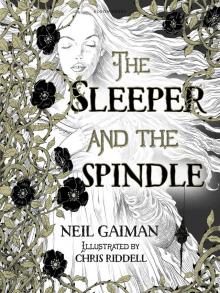 The Sleeper and the Spindle
The Sleeper and the Spindle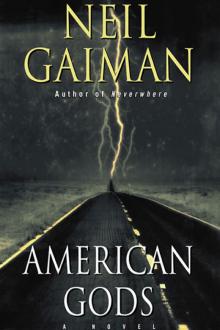 American Gods
American Gods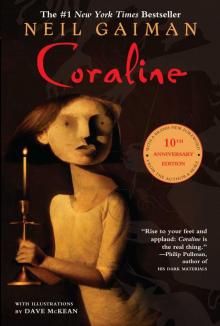 Coraline
Coraline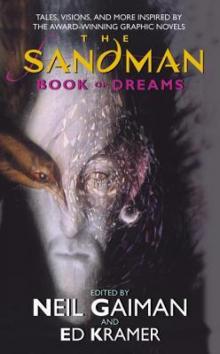 The Sandman: Book of Dreams
The Sandman: Book of Dreams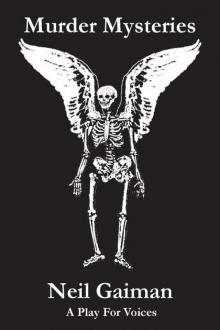 Murder Mysteries
Murder Mysteries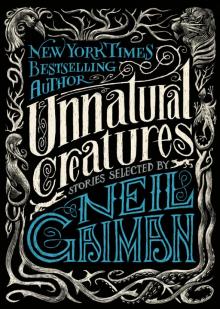 Unnatural Creatures
Unnatural Creatures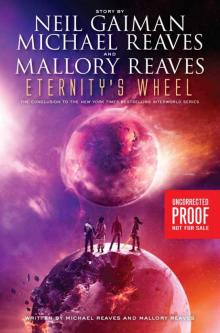 Eternity's Wheel
Eternity's Wheel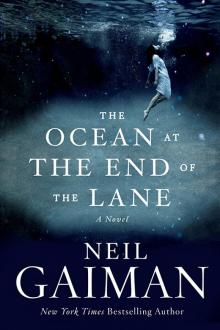 The Ocean at the End of the Lane
The Ocean at the End of the Lane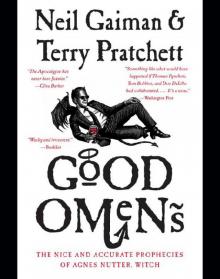 Good Omens
Good Omens Stardust
Stardust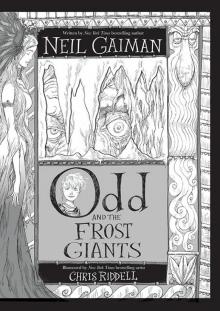 Odd and the Frost Giants
Odd and the Frost Giants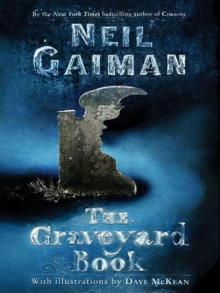 The Graveyard Book
The Graveyard Book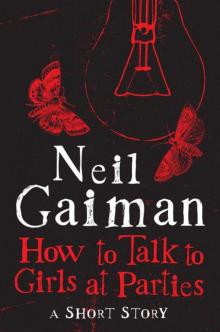 How to Talk to Girls at Parties
How to Talk to Girls at Parties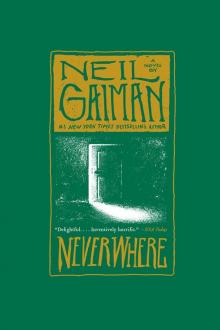 Neverwhere
Neverwhere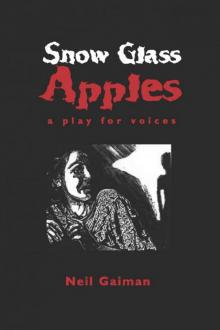 Snow, Glass, Apples
Snow, Glass, Apples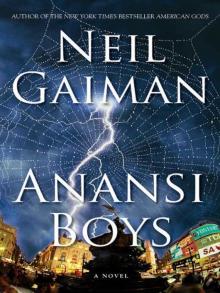 Anansi Boys
Anansi Boys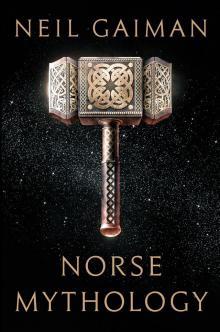 Norse Mythology
Norse Mythology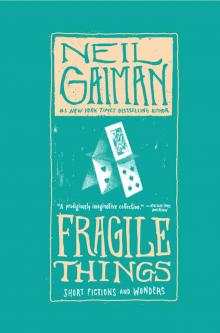 Fragile Things: Short Fictions and Wonders
Fragile Things: Short Fictions and Wonders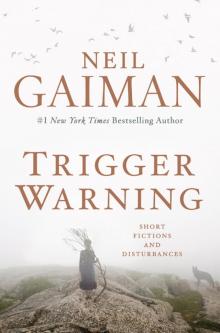 Trigger Warning: Short Fictions and Disturbances
Trigger Warning: Short Fictions and Disturbances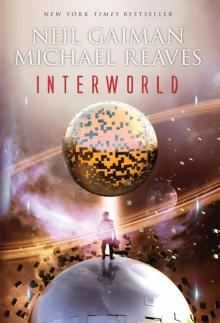 InterWorld
InterWorld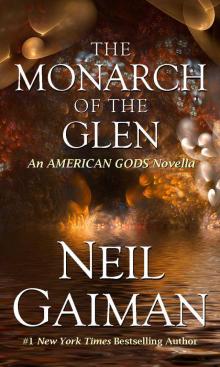 The Monarch of the Glen
The Monarch of the Glen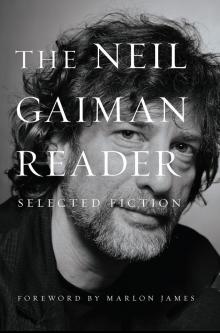 The Neil Gaiman Reader
The Neil Gaiman Reader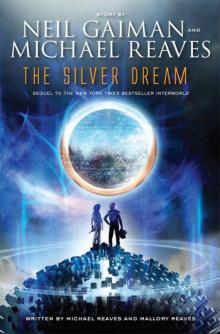 The Silver Dream
The Silver Dream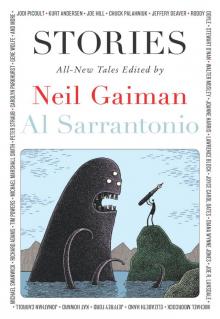 Stories
Stories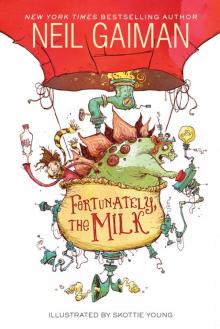 Fortunately, the Milk
Fortunately, the Milk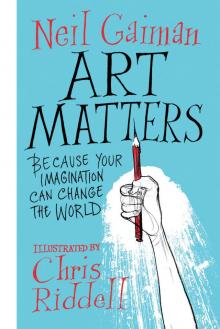 Art Matters
Art Matters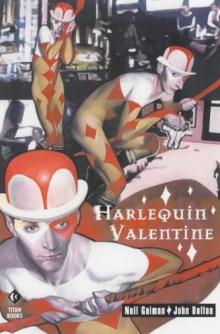 Harlequin Valentine
Harlequin Valentine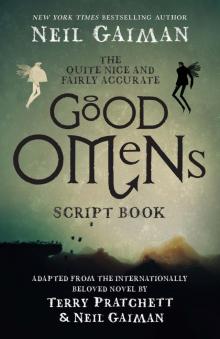 The Quite Nice and Fairly Accurate Good Omens Script Book
The Quite Nice and Fairly Accurate Good Omens Script Book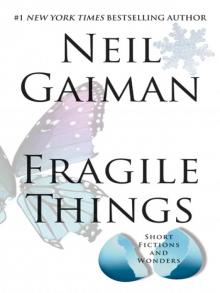 Fragile Things
Fragile Things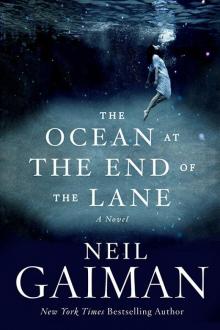 The Ocean at the End of the Lane: A Novel
The Ocean at the End of the Lane: A Novel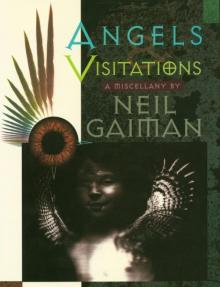 Angels and Visitations
Angels and Visitations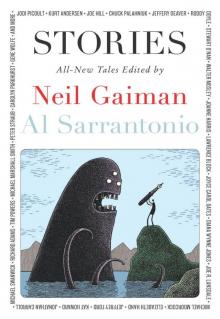 Stories: All-New Tales ngss-1
Stories: All-New Tales ngss-1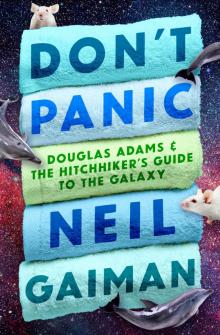 Don't Panic
Don't Panic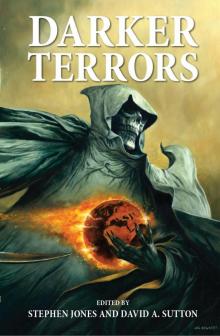 Darker Terrors
Darker Terrors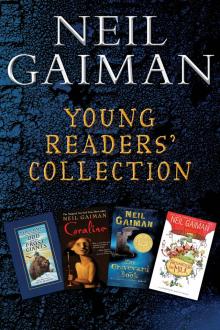 Neil Gaiman Young Readers' Collection
Neil Gaiman Young Readers' Collection A Study In Emerald
A Study In Emerald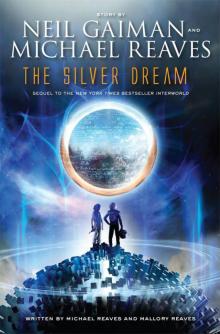 The Silver Dream: An InterWorld Novel
The Silver Dream: An InterWorld Novel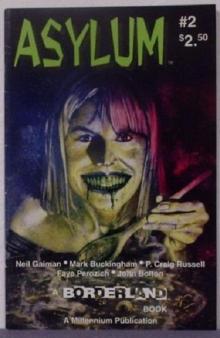 Feeders and Eaters
Feeders and Eaters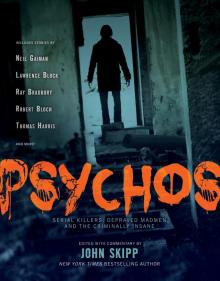 Psychos
Psychos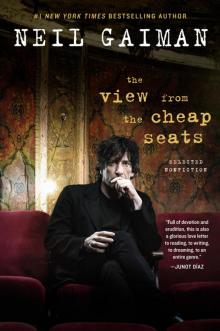 The View from the Cheap Seats
The View from the Cheap Seats Trigger Warning
Trigger Warning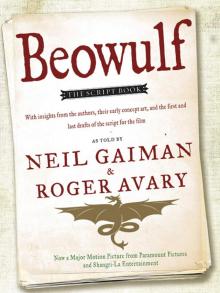 Beowulf
Beowulf Nessun Dove
Nessun Dove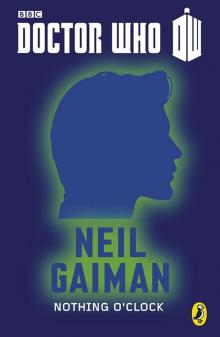 Doctor Who: Nothing O'Clock: Eleventh Doctor: 50th Anniversary
Doctor Who: Nothing O'Clock: Eleventh Doctor: 50th Anniversary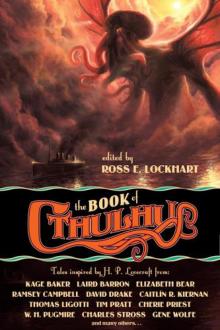 The Book of Cthulhu
The Book of Cthulhu